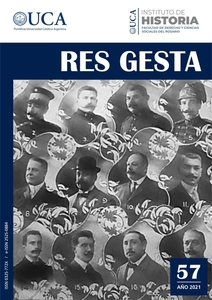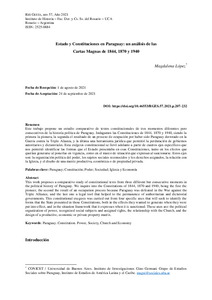Please use this identifier to cite or link to this item:
https://repositorio.uca.edu.ar/handle/123456789/13195| Título: | Estado y Constituciones en Paraguay: un análisis de las Cartas Magnas de 1844, 1870 y 1940 | Autor: | López, Gabriela Magdalena | Palabras clave: | CONSTITUCION; PODER; SOCIEDAD; RELACIONES IGLESIA-ESTADO; HISTORIA PARAGUAYA; HISTORIA CONSTITUCIONAL | Fecha de publicación: | 2021 | Editorial: | Universidad Católica Argentina. Facultad de Derecho y Ciencias Sociales del Rosario. Instituto de Historia | Cita: | López, G. M. Estado y Constituciones en Paraguay: un análisis de las Cartas Magnas de 1844, 1870 y 1940 [en línea]. Res Gesta. 2021, 57. doi: https://doi.org/10.46553/RGES.57.2021.p.207-232. Disponible en: https://repositorio.uca.edu.ar/handle/123456789/13195 | Resumen: | Resumen:
Este trabajo propone un estudio comparativo de textos constitucionales de tres momentos diferentes pero
consecutivos de la historia política de Paraguay. Indagamos las Constituciones de 1844, 1870 y 1940, siendo la
primera la pionera, la segunda el resultado de un proceso de ocupación por haber sido Paraguay derrotado en la
Guerra contra la Triple Alianza, y la última una herramienta jurídica que permitió la perduración de gobiernos
autoritarios y dictatoriales. Esta exégesis constitucional se llevó adelante a partir de cuatros ejes específicos que
nos permitió identificar las formas que el Estado presentaba en esas Constituciones, tanto en los efectos que
querían generarse al ponerlas en vigencia, como en el marco de situación que expresan al sancionarse. Estos ejes
son: la organización política del poder, los sujetos sociales reconocidos y los derechos asignados, la relación con
la Iglesia, y el diseño de una matriz productiva, económica o de propiedad privada. Abstract: This work proposes a comparative study of constitutional texts from three different but consecutive moments in the political history of Paraguay. We inquire into the Constitutions of 1844, 1870 and 1940, being the first the pioneer, the second the result of an occupation process because Paraguay was defeated in the War against the Triple Alliance, and the last one a legal tool that helped to the permanence of authoritarian and dictatorial governments. This constitutional exegesis was carried out from four specific axes that will seek to identify the forms that the State presented in those Constitutions, both in the effects they wanted to generate when they were put into effect, and in the situation framework that it expresses when it is sanctioned. These axes are: the political organization of power, recognized social subjects and assigned rights, the relationship with the Church, and the design of a productive, economic or private property matrix. |
Cobertura Espacial: | Paraguay | Cobertura Temporal: | Siglo XX Siglo XIX |
URI: | https://repositorio.uca.edu.ar/handle/123456789/13195 | ISSN: | 2525-0884 (on line) 0325-772X (impreso) |
Disciplina: | HISTORIA | DOI: | https://doi.org/10.46553/RGES.57.2021.p.207-232 | Derechos: | Acceso abierto | Fuente: | Res Gesta No. 57, 2021 |
| Appears in Collections: | RG - 2021 nro. 57 |
Files in This Item:
| File | Description | Size | Format | |
|---|---|---|---|---|
| cover_issue_391_es_AR.jpg | 176,12 kB | JPEG |  View/Open | |
| estado-constituciones-paraguay.pdf | 266,65 kB | Adobe PDF |  View/Open |
Page view(s)
88
checked on Apr 27, 2024
Download(s)
3,135
checked on Apr 27, 2024
Google ScholarTM
Check
Altmetric
Altmetric
This item is licensed under a Creative Commons License

